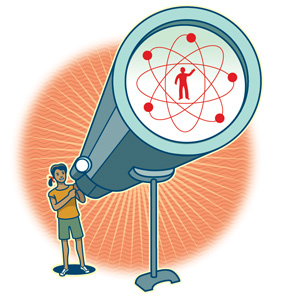
With big changes looming on the horizon for the future of work, it’s more important than ever to nurture an entrepreneurial spirit in our students. A collaborative community is key: that’s why Siri Terjesen, director of the AU Center for Innovation, aspires to create an immersive learning experience for enterprising students with a shared passion for innovation. She envisions bringing together a cohesive cohort of students who participate in workshops, field trips, mentoring opportunities, and lectures. Learning communities engage students in the life of the university and promote strong academics, self-discovery, and retention. With the help of generous philanthropic support, AU hopes to launch this leading-edge initiative to prepare the next generation of entrepreneurial leaders.
spark of an idea
The American University Center for Innovation (AUCI) harnesses the drive and commitment to active citizenship that define AU students and trains them to launch their own ventures—in the business world and beyond.
Under the direction of Siri Terjesen, the dean’s research fellow in entrepreneurship at the Kogod School of Business, AUCI emphasizes skills that cannot yet be automated: critical thinking, creativity, and design. It also supports a variety of student start-ups, from social ventures to biomedical applications to the creative arts.
“It’s important to develop an entrepreneurial mindset among our university students,” Terjesen says. “If you see a problem out there in the world, it’s not just a problem—it’s a challenge. And it’s something that you might solve.”
Of the world’s 350 entrepreneurship centers, AUCI ranks among the top 20, according to the Association to Advance Collegiate Schools of Business. It brings together students, businesspeople, alumni, and more than 50 professors to engage in all phases of entrepreneurship, from sparking an idea to launching a project.
The centerpiece of AUCI is the incubator, which has helped launch more than 40 student-led ventures, including the MEANS database, which helps track excess food supplies to feed the hungry, and Sand Scan, which uses drone-based research and 3D modeling software to combat coastline erosion. “AUCI professors guided my thinking about how to turn my idea into an actual company,” says Sand Scan founder Matthew Mullin, CAS/BS ’18.
When Megan Nelson, CAS/MS ’16, launched MicroInvestigate, a noninvasive way to detect respiratory diseases, she became the first AU student accepted into the National Science Foundation’s (NSF) prestigious I-Corps, which helps bring projects developed for government purposes to market. AU has since been declared an NSF I-Corps site, becoming just the second liberal arts college in the United States to earn the designation.
“Entrepreneurship is a draw for new people,” says Kathryn Walters-Conte, director of AU’s professional sciences master’s in biotechnology. “Our students are building skills that will make them more successful in their careers. If they don’t get those skills now, when will they?”
Students, who come to the center from all of AU’s schools and colleges, hone their skills through hands-on opportunities, from entering pitch competitions to conducting research to presenting to financiers. Last year, 40 students travelled to Norway on two grant-funded trips to learn about different types of entrepreneurship: nonprofit, social, and corporate.
Sophia Celeste Vos, SIS/BA ’19, was among the 15 students on the spring 2017 trip, which focused on the impact of fisheries on Norway’s economy.
“I will never forget standing on the edge of a floating salmon farm in the snowy Norwegian Sea. In a week of consulting with one of the world’s largest salmon distributers, I learned more than most semester-long courses,” she says. “This was a catalyst for my education as an innovator.”
For information on how you can support big ideas around innovation and entrepreneurship at AU, contact Courtney Surls, vice president of Development and Alumni Relations, at 202-885-5900 or vpdar@american.edu.
Dabbling with Innovation
The new Don Myers Technology and Innovation Building is the epicenter of cutting-edge collaboration on campus. The building, named for Myers, Kogod MBA ’78, AU’s late CFO, vice president and treasurer, fosters a rich ecosystem of energy, ideas, and resources. Located on the 70,000-square-foot East Campus, it was erected with broad and generous support from the AU Board of Trustees and Myers’s family, friends, and colleagues.
Home to the AU Center for Innovation, the Myers Building also contains the university’s top-ranked Game Lab. A joint project of the School of Communication and the College of Arts and Sciences, the lab is a nexus of research on social impact gaming, or “persuasive play.”
Recently, students have been using the Game Lab to explore new therapies to address cognitive issues and chronic diseases, such as anxiety, pain management, and heart disease, through interactive health and educational games.
The Design and Build Lab (DABL, pronounced “dabble”), a hands-on makerspace, boasts two 3D printers, state-of-the-art electronics, and specialized tools for designing, prototyping, and creating cross-disciplinary projects. While the space is especially useful to performing arts students in the Creativity and Innovation class and to AUCI’s entrepreneurs, it is open to all AU students, faculty, and staff.
The computer science, physics, and mathematics and statistics departments are also housed in the Myers Building. Physics professor Gregory Harry—a member of the Nobel Prize-winning LIGO Scientific Collaboration, which studies gravitational waves—notes the collaborative possibilities. “The interpretation of our results is aided by being just down the hall from the math and statistics department,” he says. “With a new physics optics lab coming next door, our shared focus on optics should allow for collaborations, from the highbrow, like the impact of quantum mechanics on optical noise, to the mundane, like being able to share screwdrivers.”
These and other pioneering resources are catalysts for innovation that allow AU to envision the future. Donor support is the spark that ignites opportunities for advancement of new ideas.